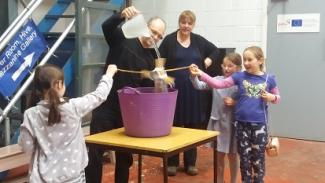Dr Jan Maskell summarises SGR’s activities during our science education week.
ResponsibleSci blog, 28 March 2018
“We are recycling plastic bottles – but is that enough? Nature cannot re-use plastics - but sometimes man just throws it away. Good scientists are designing… materials that can be re-used or re-grown.”
This was how the winner of this year’s Science4Society (S4S) Week competition ‘Am I a good scientist?’ Tristyn Clemett answered the question. He also asked whether we need to buy all the things we do – and whether we need to drive to buy things. “Good scientists need to find a fuel that does not make greenhouse gases and helps the environment.”
What is a ‘good scientist’?
This is a tricky question to answer. Some take a conventional view – that a ‘good scientist’ does rigorous research to come up with objective data – and a bad scientist is guilty of lying and cheating in their work. The competition asked entrants to see it in a broader sense and think beyond this, arguably narrow, view.
SGR’s perspective is that a good scientist is one who also addresses issues of wider ethics related to science, design and technology – including the potential contribution that their work might (or might not!) make to peace, social justice and environmental sustainability. And even this can mean many different things.
Tristyn’s entry stood out as he was asking some of the awkward questions that show aspects of the critical thinking young people are expected to develop – and he is only 8 years old!
Other activities
S4S Week is a collection of science education activities, co-ordinated by Scientists for Global Responsibility, and designed to inspire young people. The activities specifically focus on the contribution that science, design and technology can make to peace, social justice and/or environmental sustainability. The project was set up to provide an alternative to activities funded by the arms and fossil fuel industries, such as The Big Bang national science fair.
The project website – www.s4s.org.uk – includes a range of resources for teachers and students that are downloadable for free. New this year are ‘Food trump cards’ which cover nutritional information as well as carbon footprint and water footprint data – and can be used in a variety of fun and educational ways. Other resources on the website include debating packs and practical activity guides, such as one for building a model water turbine.
Also during this year’s S4S Week, SGR organised visits for over 100 students from a Lancashire primary school, the University of Salford, Lancaster University and the University of Central Lancashire to community renewable energy projects and eco-homes operated by Lancaster Cohousing and Halton Lune Hydro. These visits showed the students how high-quality design, technology and co-operative practices can contribute towards environmentally sustainable living.
.jpg)
Pupils from Quernmore School, Lancashire, have fun making and testing model water turbines.
Look out for new resources coming soon on the website – and next year’s competition which will be launched in September!
Dr Jan Maskell is an occupational psychologist and co-ordinator of SGR’s Science4Society Week. S4S Week 2018 was funded by the Martin Ryle Trust and Naturesave Trust.
More photos from S4S Week 2018 can be viewed on this web-page.
